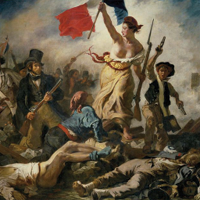
Psychohistory
Bringing Psychohistory in France and Switzerland
by Marc-André Cotton*—Int. Psychohistorical Association
This article was published in the peer-reviewed journal Clio’s Psyche, Vol. 26, No 2, (Winter 2020).
Abstract: Trained through the 2001-2002 Learn Psychohistory OnLine program, I was deeply impressed by psychohistorical concepts that complemented my ongoing therapeutic process. With therapist Sylvie Vermeulen, I founded “Regard conscient”, a French research project based on the assumption that adults remain deeply imprinted with unacknowledged emotional experiences. I became International Vice President of the International Psychohistorical Association (IPhA) in 2014 and in psychohistorical periodicals I published on a variety of subjects such as poisonous pedagogy, psychoanalysis, terrorism, political psychology, perinatal psychology, and positive parenting. My efforts also focused on educating the general public about psychohistorical issues and the adverse influence of violence in education with one of the leading voices of the positive parenting movement in France, the French quarterly magazine PEPS. Thanks to these activities, psychohistory has gained in visibility in France within a community of concerned adults and dedicated professionals.

Now in my early 60s, I still consider myself a “young” European psychohistorian; I was trained by James C. Duffy through a 12-month psychohistory online course in 2000-2001, and his approach struck me immediately as being both profound and wide. Through many years of work on my own childhood traumas, I gained awareness of the consequences of both denial and reenactments on our daily lives. The extensive study of psychohistorical concepts impressed me deeply, complementing my ongoing therapeutic process with theoretical and academic material. (For an extensive description of the Learn Psychohistory OnLine program, see James C. Duffy, “Learning Psychogenic Psychohistory Online,” The Journal of Psychohistory, Vol. 28, No. 3, Winter 2001.) Throughout this course, my mentor—a former university psychology professor and independent researcher—served as a benevolent father figure, whose skillful feedback triggered painful memories of paternal humiliations and contempt.
With therapist Sylvie Vermeulen, I soon founded our “Regard conscient” research project to bring to light the links between repressed sufferings—particularly those of earliest childhood—and their acting out during different stages of life. To date, our website has published in French nearly 200 papers by various authors on subjects such as violence in education, psychoanalysis, terrorism, political psychology, perinatal psychology, and positive parenting. Based on two-decades of experience in therapeutic listening and research, our main assumption is that adults remain deeply imprinted with unacknowledged emotional experiences, which often keep them confined by early behavioral patterns. In our view, the compulsion to recreate painful situations is an invitation to revisit these sufferings consciously, thereby being liberated from their emotional burden. (See our English welcome page.)
Typical of my psychohistorical approach is “In Switzerland: Childrearing Aimed at National Consent” (The Journal of Psychohistory , 36, 2, 2008, 163-185), which examines the Swiss consent as a political consequence of severe childrearing demands inflicted by Swiss caretakers on the child’s spontaneous consciousness. In my case I was conceived as part of a project envisioned by my parents. There was scarcely any space left in my life for the vital impulses of a child, because such spontaneity threatened my parents’ plans for my upbringing. I realized then that the Swiss inclination for conformity is linked to the contempt parents unconsciously inflict on their youngsters’ emotional needs from the very start, as they comply with this collective aspiration for conformity. The ensuing sufferings can be understood as the origin of a recurring social ill-being that reproduces itself in Swiss political life, particularly in the growing trends of nationalism and xenophobia.
The September 11 terror attacks and the ensuing war on terrorism waged by the Bush administration provided an opportunity to examine the collective restaging of what Alice Miller characterized as “poisonous pedagogy.” In particular, the involvement of psychologists in “enhanced interrogation techniques”—a euphemism for the U.S. government’s program of systematic torture of detainees—raised legitimate concern. My approach stressed that behavioral scientists have long been noted for their engagement in dubious experiments aimed at conditioning the human brain. In my view, this willingness to control originates in early experiences of maternal disruption forced on children and routinely manipulated by caretakers, as evidenced by B. F. Skinner’s well-documented early childhood. The leading role played by behaviorism in the wake of the 9/11 trauma can be understood as drawing attention to the dire consequences of such poisonous pedagogy (“Poisonous Pedagogy: The Contentious Drift of Psychology,” The Journal of Psychohistory, 40, 4, Spring 2013). I presented this at the June 2013 IPhA conference and was soon named the IPhA’s International Vice President.
In my book, In the Name of the Father: The Bush Years and the Legacy of Childrearing Violence (2014), I searched for and documented the unacknowledged motivations underlying the Bush administration’s military buildup for a so-called “war on terror” and takeover of Iraq’s vast oil wealth. These inclinations can be found both in America’s ruling class and in the general public, which quickly accepted drastic restrictions on civil liberties in the name of “national security.” Just as so many Americans learned to submit quietly in childhood under the threat of corporal punishment, they acquiesced as adults to the brutal international agenda staged by their leaders. From that perspective, this volume is a case study of the roots of unconscious adult motivation found in early childhood trauma.
Over the last five years in the Psychohistory News and Clio’s Psyche I published on topics such as the intergenerational transmission of trauma and grief in the Ukraine crisis, the underlying causes of public violence in the wake of European terrorist attacks, and the collective restaging of birth trauma in the Greek economic crisis. The latter study incorporates the prenatal psychology approach of our German colleague Ludwig Janus and Cypriot-American Vamik Volkan’s concept of “time collapse” to shed a fresh light on the Greek struggle.
At the time, events in Europe retained my attention, including a personal response to Islamic terrorism, emotional distress afflicting a majority of French citizens in support of revoking the citizenship of terrorists, and the implication of childrearing violence in the “Leave” vote of British citizens on June 23, 2016. In my view, these public struggles all give indication of the powerful forces at play when repressed feelings and emotions associated with child abuse are displaced in a heated political context.
In 2016, The Journal of Psychohistory published an extended study of the Bush dynasty adapted from my 2014 French volume. It examines George W. Bush’s paternal inheritance, the problem of maternal abuse and its subsequent psychic wounds, and the impact of unresolved grief after Bush’s loss of his younger sister, Robin. As a vengeful young adult at Yale, Bush apparently restaged childhood traumas before getting involved in dirty politics by supporting unlawful hazing practices. Then, as Governor of Texas, he promoted the death penalty and a zero-tolerance approach to juvenile offenders. Controversial decisions of the Bush administration regarding the Enhanced Interrogation Program, the Guantanamo Bay detention camp, and many others are further scrutinized as collective reenactments of parental abuse deeply engrained in American society. From that standpoint, Bush’s intergenerational legacy of trauma bears strong affinities with that of the whole nation (The Journal of Psychohistory, 44, 1, 2016).
As the IPhA’s International Vice President based in France, my efforts focused on educating the general public about psychohistorical issues surrounding supportive parenting and the adverse effects of violence in education, all while France and the Council of Europe were discussing a general ban on the corporal punishment of children. Since 2015, the IPhA maintains a booth at Lyon’s annual Eco-Fair, one of France’s biggest gatherings of environmental and social activists. Along with fellow therapist Sylvie Vermeulen, I shared information on the psychohistorical perspective, displaying books in French and English as well as copies of PEPS magazine, our French quarterly on positive parenting. Psychohistory News published articles supporting our efforts, including “Bringing Psychohistory to One of France’s Biggest Eco-Fairs” (Psychohistory News, 35, 2, Spring 2016), and more recently, “Report from Europe: Psychohistory in the French Speaking Community” (Psychohistory News, 37, 4, Fall 2018). Thanks to these activities, psychohistory has gained visibility within a small but growing community of concerned adults and dedicated professionals.
Since 2012, my regular contributions to the French quarterly magazine PEPS have played a large role in this process. This 68-page print publication is one of the leading voices of the positive parenting movement in France, and its editor, Catherine Dumonteil-Kremer, is an enthusiast for our field. Psychohistory-related articles have recently covered topics such as Obama’s multicultural heritage, the infancy of Sigmund Freud, positive parenting and guilt, the use of John Bowlby’s attachment theory to understand the Harvey Weinstein sex scandal, and Donald Trump’s European roots. This improved visibility owes a great deal to my regular use of Facebook for weekly updates and comments on supportive parenthood for the benefit of my 3500+ Facebook friends. Likewise, before the French presidential election in May 2017, the eco-parenting magazine Grandir Autrement (English translation: Growing up Differently) published an extensive article on psychohistory with links to resources such as Lloyd deMause’s Foundations of Psychohistory (1982).
I have also been lecturing at an annual summer university organized by PEPS magazine. Last year’s conference was dedicated to Trump’s family heritage, but I always stress the importance of applying psychohistory in the lives of participants. Topics I addressed in past years include the intergenerational transmission of trauma and on the therapeutic process.
Last spring, I began close cooperation with La Maison de l’enfant (The Child’s Home) , an organization dedicated to training professional parenting coaches. Among other things, I offer here a psychohistorical perspective on Freud’s own childhood traumas and their impact on psychoanalysis. In France, Freudian concepts are influential among academics and child welfare professionals, and my contribution elicits considerable interest. Indeed, discernible imprints of early traumas in Freud’s work have been overlooked by biographers. This painful blind spot may account for a detrimental lack of concern with intimacy between mother and infant among professionals with Freudian backgrounds. Clio’s Psyche has recently published an article entitled “Sigmund Freud, Son of Amalia,” clarifying my treatment of this topic (24, 1, Winter 2018).
Let me conclude this brief presentation with a few thoughts on psychohistory. Defined as “the science of historical motivations” and combining the insights of psychotherapy with the research methodology of social sciences (The Association for Psychohistory), our field must nevertheless affirm its unique nature. In our quest to unveil unconscious dynamics, we assume such processes exist and are active within the human mind and society. This is not the case with strictly historical scholars, for instance, and might explain why other social sciences have hit major stumbling blocks with psychohistory.
Specific to human nature, our reflective consciousness drives us to reconsider destructive schemes of behavior as a means of finding ways to heal individually and collectively. Such metacognition is central in the process of re-experiencing what has been experienced (trauma for instance), and ultimately in self-realization.
Our uniqueness as a disparate team of researchers originates in a common willingness to expand our emotional awareness through the therapeutic experience. It is indeed how I came to psychohistory and what fuels my ongoing interest in this subject. In my experience, psychohistorians are by essence subject-centered and work outwards through this prism, whereas other social scientists remain mostly object-centered. It is therefore arguable that psychohistory should take fuller responsibility for its scope as a meta-discipline, that is, a field likely to make sense of all others.
*Marc-André Cotton, MA, the President of the International Psychohistorical Association, and an International Member of the Psychohistory Forum, is a teacher, independent scholar, and director of the French website Regard conscient, dedicated to exploring the unconscious motivations of human behavior. He authored the French psychohistorical book Au Nom du père, les années Bush et l’héritage de la violence éducative published in 2014 by L’Instant présent (Paris).
